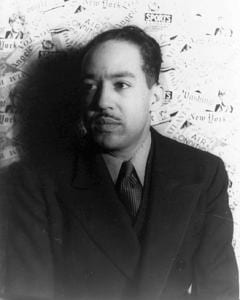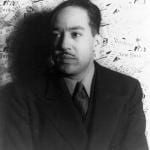Little Lyric (Of Great Importance)
I wish the rent
Was heaven sent.*
When a great poet gives us a poem as short as the title, we must pause. If I wrote such a thing, then in all probability some teacher assigned a poem and this was my way of getting the darn thing done in time for bed on Sunday night. This poem is not that. Langston Hughes could clear this throat, double down on inspiration, and poetically preach for pages.
Why so brief here?
Rent is a little problem, it is only money, that looms large when you cannot make the rent. I know this truth having struggled with rent payments for years.
I could chat: “I wish the rent/Was heaven sent.”
It is only money, I told myself, but rent was also the home where Hope and I lived and loved. Eventually we could not pay the rent, so we moved in with my folks. The rent won.
The months with my folks were some of the most jolly of our lives. We loved being there with Mom, Dad, Daniel, and Nana. In many ways, this is more the way family should be if our economy allowed such living arrangements to be more common. Yet before the move, the rent loomed large.
How would I pay the rent?
I would pray for prudence. I got an extra job and then another extra-extra job. The rent still came due and we were always, almost, short or actually short. Overdraft, the debt trap of checking, would soothe the immediate pain, but then the rent was due again, but now with debt payments.
This mostly was my faulty: the bad planning of a young man. This is not always so for everyone. The rent falls on the just and unjust and many of our neighbors, Russian emigres fleeing communism, also struggled with rent. This was the trade they made for freedom: serfs do not worry about rent.
Here is the tension: not everyone has an intact family (God help us!) that can help with housing. What is to be done?
If we “give” rent too easily, say as a right that can be demanded, then a certain liberty is lost: the freedom to choose and take the consequences (at least many of them!) of that choice.
I failed. I made some decisions, including one to work at a non-profit, and those did not work out. We had to give up our beloved little apartment.
The failure taught me something and I made different decisions in the future. If the safety net had been too obvious, then I might have taken risks that would have been unwise, if not financially, then in terms of life choices. After all, if a move to square two is guaranteed, then the temptation is to look ahead to square four. I might have taken bigger risks and so need bigger guarantees. Nothing we do is “just us:” we benefit from community. Having some acts be mostly us is liberating: we are making choices, even contrary to the community norms!
Liberty comes with the possibility of failure: even great failure. We choose the fruit in the garden and get the results: all of the dreadful results.
Wait!
All the results of our choices do not fall on us: there is mercy. God gives us as much mercy as He can without making us mere robots. We obligate ourselves to rent and pay at least some of the price of our choice. Rent is not merely Heaven sent or we are reduced to children. And yet. . .
Social systems are unjust and many who cannot pay the rent, should have been able to do so.
Nobody Christian looks at people without homes and thinks: “This is great!” People need homes: secure, safe, homes. Heaven gave us a planet with abundant resources. These resources belong, in the deepest sense, to every human being on the planet. However, all of us also enjoy autonomy before God. We can give or not give assent even to God!
——————
 Langston Hughes is my favorite American poet . . . since fifth grade! (This was one of the few things to come from that no-good year.) He always is worth reading.
Langston Hughes is my favorite American poet . . . since fifth grade! (This was one of the few things to come from that no-good year.) He always is worth reading.
*Hughes, Langston. Selected Poems of Langston Hughes (Vintage Classics) (p. 124). Knopf Doubleday Publishing Group. Kindle Edition.











